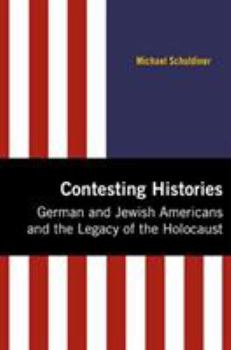Contesting Histories: German and Jewish Americans and the Legacy of the Holocaust
(Part of the Modern Jewish History Series)
Starting with popular objections to America's entry into World War I and ending with recent academic debates between Christopher Browning and Daniel Goldhagen over the legacy and meaning of the Holocaust, Schuldiner provides readers with a longer historical context and a deeper study of the Holocaust's reception and place in American historiography. He examines how events from World War I, the 1920s and 1930s, and World War II came to color America's understanding (or lack thereof) of the Holocaust in the U.S. in both the German American and Jewish American communities. He looks at the anti-German sentiment in the U.S. during World War I; confrontations between German American isolationists and Jewish American interventionists in the 1930s and 1940s; boycotts of German goods in the U.S. and counterboycotts of Jewish American businesses in Nazi Germany; pressure on Hollywood movie studios from appeasement-oriented members of Congress to avoid antagonizing Hitler; and the U.S. State Department's resistance to allowing sanctuary for Jews seeking to immigrate. Regarding events after 1945, Schuldiner studies the debates over the erection of the United States Holocaust Memorial Museum in Washington, D.C., "The Battle of Bitburg" (President Reagan's visit to a German military cemetery), and the recent bitter discussions on the question, "Were all Germans willing executioners of their Jewish countrymen, or were the German people historically and culturally predisposed to support the final solution?" This longitudinal approach provides a needed corrective to the evolving American understanding about the sources and legacies of the Holocaust.
Format:Hardcover
Language:English
ISBN:0896726983
ISBN13:9780896726987
Release Date:September 2011
Publisher:Texas Tech University Press
Length:336 Pages
Weight:1.65 lbs.
Dimensions:1.2" x 6.4" x 9.3"
Customer Reviews
0 rating





